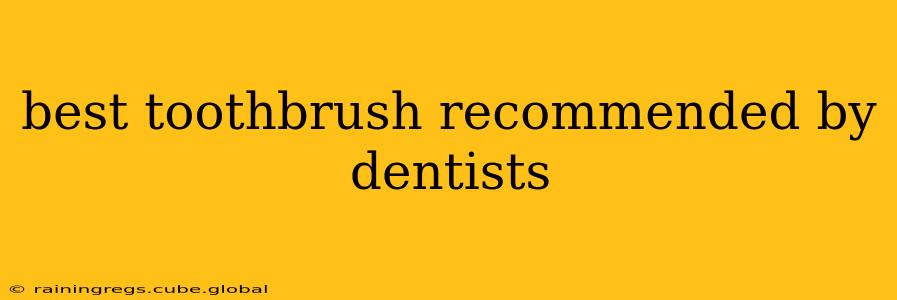Choosing the right toothbrush can significantly impact your oral health. While there's no single "best" toothbrush universally endorsed by all dentists, certain features and types consistently receive high recommendations. This guide will help you navigate the options and find the perfect brush for your needs, informed by dental professional advice.
What Makes a Toothbrush "Best"?
Before diving into specific recommendations, let's understand the key factors dentists consider when advising patients on toothbrush selection:
-
Bristle Type and Hardness: Soft-bristled toothbrushes are almost universally recommended. Medium or hard bristles can damage enamel and gums, leading to sensitivity and gum recession. Look for the words "soft" clearly indicated on the packaging.
-
Brush Head Size: The brush head should be small enough to comfortably reach all areas of your mouth, especially the back molars. A large head can make it difficult to thoroughly clean every surface.
-
Handle Design: A comfortable and ergonomic handle is crucial for effective brushing. Look for a handle that fits comfortably in your hand and allows for good control.
-
Features: Some toothbrushes offer additional features like angled bristles to reach back teeth more easily, tongue cleaners, or even built-in timers to ensure you brush for the recommended two minutes.
Types of Toothbrushes Recommended by Dentists
Dentists generally recommend two main types:
-
Manual Toothbrushes: These are the traditional toothbrushes with a handle and bristles. Choosing a soft-bristled manual toothbrush with a smaller head is a safe and effective option for most people. The key is proper brushing technique.
-
Electric Toothbrushes: Electric toothbrushes, particularly those with oscillating-rotating or sonic vibrations, can be highly effective at removing plaque and improving gum health. They often include timers and pressure sensors to guide users. However, the cost is generally higher than manual toothbrushes.
What are the Best Brands of Toothbrushes Recommended by Dentists?
Many reputable brands produce high-quality toothbrushes. While specific brand endorsements vary among dentists, brands often cited for their quality and features include:
-
Oral-B: Known for its electric toothbrushes with oscillating-rotating technology, often lauded for their effectiveness in plaque removal.
-
Philips Sonicare: Another popular electric toothbrush brand, using sonic vibrations to clean teeth.
-
Colgate: Offers a wide range of both manual and electric toothbrushes at various price points.
It's crucial to remember that the "best" brand is subjective and depends on individual preferences and needs. Consider your budget and comfort level when making your selection.
What Toothbrush is Best for Sensitive Teeth?
For those with sensitive teeth, dentists often recommend extra-soft bristled toothbrushes and gentle brushing techniques. Avoid aggressive scrubbing. Some electric toothbrushes offer sensitivity modes that reduce brushing intensity.
How Often Should I Replace My Toothbrush?
Dentists generally recommend replacing your toothbrush every 3-4 months, or sooner if the bristles become frayed or worn. Frayed bristles are less effective at cleaning and can even damage your gums.
Can I Use a Toothbrush That’s Been Sitting Around for a While?
It's best to replace your toothbrush as recommended to maintain optimal hygiene. Old toothbrushes can harbor bacteria and lose their effectiveness.
Conclusion: Finding Your Perfect Toothbrush
The best toothbrush for you will depend on your individual needs and preferences. However, by prioritizing soft bristles, a comfortable handle, and proper brushing technique, you can significantly improve your oral health. Consult with your dentist for personalized recommendations based on your specific dental needs and any existing conditions.
